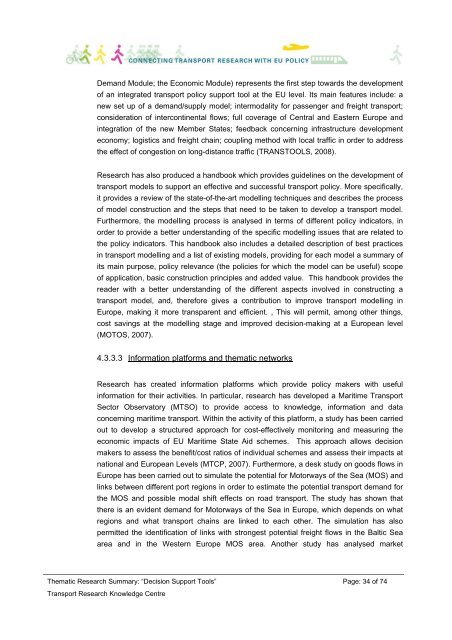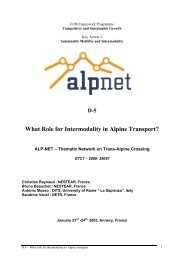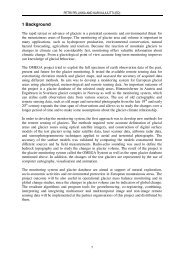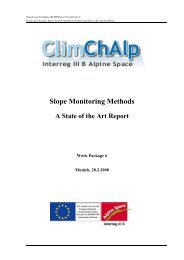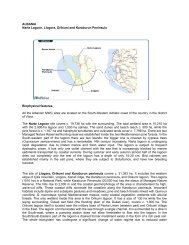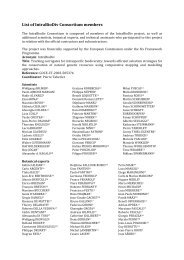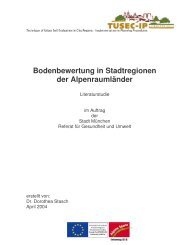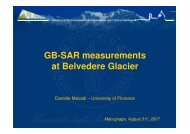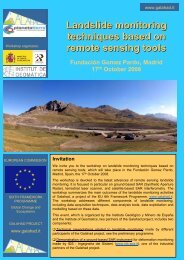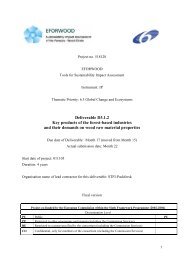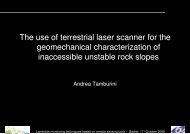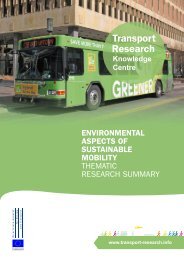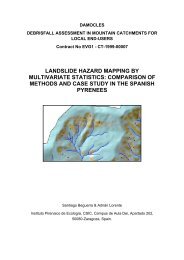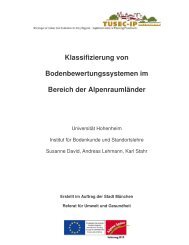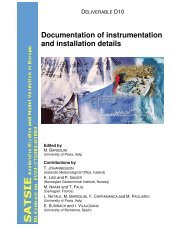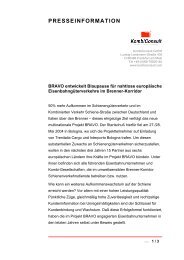Decision Support Tools - Thematic Research Summary - Transport ...
Decision Support Tools - Thematic Research Summary - Transport ...
Decision Support Tools - Thematic Research Summary - Transport ...
Create successful ePaper yourself
Turn your PDF publications into a flip-book with our unique Google optimized e-Paper software.
Demand Module; the Economic Module) represents the first step towards the developmentof an integrated transport policy support tool at the EU level. Its main features include: anew set up of a demand/supply model; intermodality for passenger and freight transport;consideration of intercontinental flows; full coverage of Central and Eastern Europe andintegration of the new Member States; feedback concerning infrastructure developmenteconomy; logistics and freight chain; coupling method with local traffic in order to addressthe effect of congestion on long-distance traffic (TRANSTOOLS, 2008).<strong>Research</strong> has also produced a handbook which provides guidelines on the development oftransport models to support an effective and successful transport policy. More specifically,it provides a review of the state-of-the-art modelling techniques and describes the processof model construction and the steps that need to be taken to develop a transport model.Furthermore, the modelling process is analysed in terms of different policy indicators, inorder to provide a better understanding of the specific modelling issues that are related tothe policy indicators. This handbook also includes a detailed description of best practicesin transport modelling and a list of existing models, providing for each model a summary ofits main purpose, policy relevance (the policies for which the model can be useful) scopeof application, basic construction principles and added value. This handbook provides thereader with a better understanding of the different aspects involved in constructing atransport model, and, therefore gives a contribution to improve transport modelling inEurope, making it more transparent and efficient. , This will permit, among other things,cost savings at the modelling stage and improved decision-making at a European level(MOTOS, 2007).4.3.3.3 Information platforms and thematic networks<strong>Research</strong> has created information platforms which provide policy makers with usefulinformation for their activities. In particular, research has developed a Maritime <strong>Transport</strong>Sector Observatory (MTSO) to provide access to knowledge, information and dataconcerning maritime transport. Within the activity of this platform, a study has been carriedout to develop a structured approach for cost-effectively monitoring and measuring theeconomic impacts of EU Maritime State Aid schemes. This approach allows decisionmakers to assess the benefit/cost ratios of individual schemes and assess their impacts atnational and European Levels (MTCP, 2007). Furthermore, a desk study on goods flows inEurope has been carried out to simulate the potential for Motorways of the Sea (MOS) andlinks between different port regions in order to estimate the potential transport demand forthe MOS and possible modal shift effects on road transport. The study has shown thatthere is an evident demand for Motorways of the Sea in Europe, which depends on whatregions and what transport chains are linked to each other. The simulation has alsopermitted the identification of links with strongest potential freight flows in the Baltic Seaarea and in the Western Europe MOS area. Another study has analysed market<strong>Thematic</strong> <strong>Research</strong> <strong>Summary</strong>: “<strong>Decision</strong> <strong>Support</strong> <strong>Tools</strong>” Page: 34 of 74<strong>Transport</strong> <strong>Research</strong> Knowledge Centre


